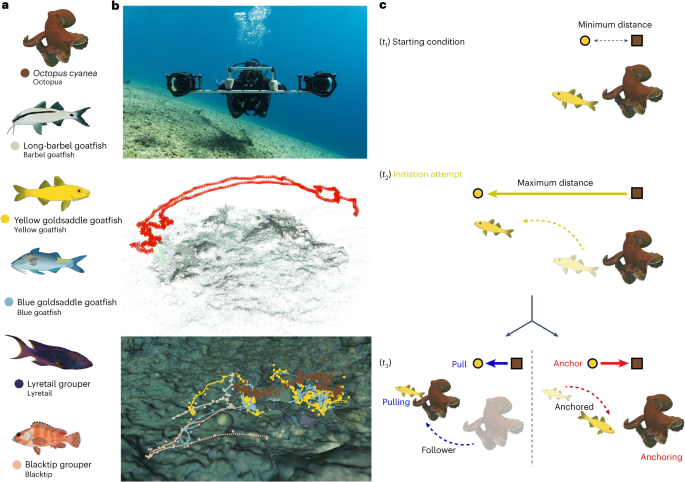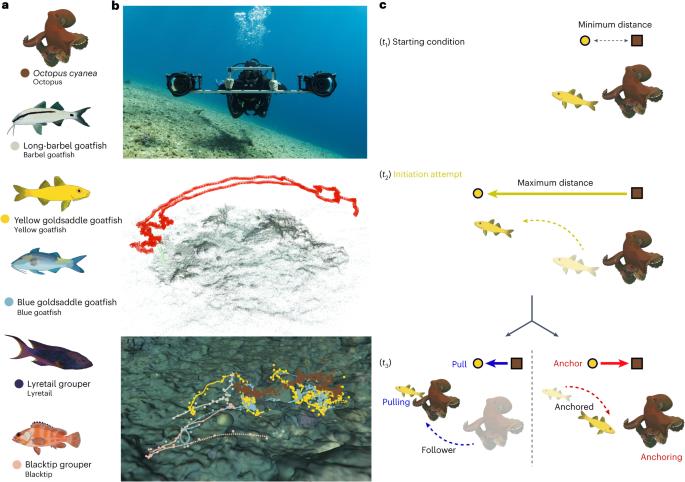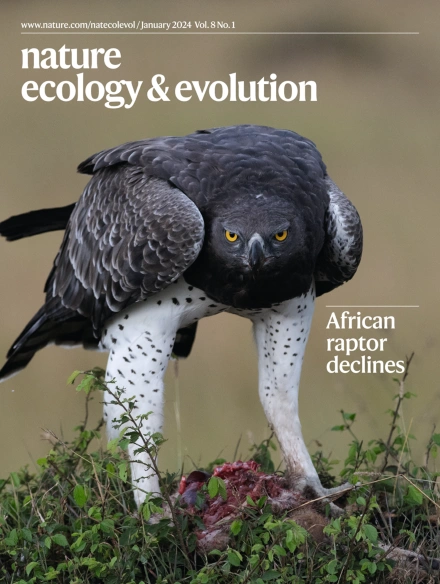Multidimensional social influence drives leadership and composition-dependent success in octopus–fish hunting groups
IF 13.9
1区 生物学
Q1 ECOLOGY
引用次数: 0
Abstract
Collective behaviour, social interactions and leadership in animal groups are often driven by individual differences. However, most studies focus on same-species groups, in which individual variation is relatively low. Multispecies groups, however, entail interactions among highly divergent phenotypes, ranging from simple exploitative actions to complex coordinated networks. Here we studied hunting groups of otherwise-solitary Octopus cyanea and multiple fish species, to unravel hidden mechanisms of leadership and associated dynamics in functional nature and complexity, when divergence is maximized. Using three-dimensional field-based tracking and field experiments, we found that these groups exhibit complex functional dynamics and composition-dependent properties. Social influence is hierarchically distributed over multiscale dimensions representing role specializations: fish (particularly goatfish) drive environmental exploration, deciding where, while the octopus decides if, and when, the group moves. Thus, ‘classical leadership’ can be insufficient to describe complex heterogeneous systems, in which leadership instead can be driven by both stimulating and inhibiting movement. Furthermore, group composition altered individual investment and collective action, triggering partner control mechanisms (that is, punching) and benefits for the de facto leader, the octopus. This seemingly non-social invertebrate flexibly adapts to heterospecific actions, showing hallmarks of social competence and cognition. These findings expand our current understanding of what leadership is and what sociality is. Using three-dimensional field-based tracking and field experiments, the authors find that octopus–fish collective hunting groups exhibit complex functional dynamics and composition-dependent properties, in which different members of the group lead on different decisions.


多维社会影响驱动章鱼-鱼类狩猎群体的领导力和取决于组成的成功。
动物群体中的集体行为、社会互动和领导能力往往受个体差异的驱动。然而,大多数研究都集中于同种动物群体,其中个体差异相对较小。然而,多物种群体需要高度不同表型之间的互动,从简单的利用行为到复杂的协调网络,不一而足。在这里,我们研究了原本孤立的章鱼和多种鱼类的狩猎群体,以揭示当分歧最大化时,领导力的隐藏机制以及功能性质和复杂性的相关动态。通过三维现场跟踪和现场实验,我们发现这些群体表现出复杂的功能动态和依赖于组成的特性。社会影响力在代表角色专业化的多尺度维度上分层分布:鱼类(尤其是山羊鱼)驱动环境探索,决定在哪里,而章鱼则决定群体是否移动以及何时移动。因此,"经典领导力 "可能不足以描述复杂的异质系统,在这种系统中,领导力可以通过刺激和抑制运动来驱动。此外,群体的组成改变了个人投资和集体行动,引发了伙伴控制机制(即冲撞),并使事实上的领导者章鱼获益。这种看似非社会性的无脊椎动物灵活地适应了异种行动,显示出社会能力和认知的特征。这些发现拓展了我们目前对领导力和社会性的理解。
本文章由计算机程序翻译,如有差异,请以英文原文为准。
求助全文
约1分钟内获得全文
求助全文
来源期刊

Nature ecology & evolution
Agricultural and Biological Sciences-Ecology, Evolution, Behavior and Systematics
CiteScore
22.20
自引率
2.40%
发文量
282
期刊介绍:
Nature Ecology & Evolution is interested in the full spectrum of ecological and evolutionary biology, encompassing approaches at the molecular, organismal, population, community and ecosystem levels, as well as relevant parts of the social sciences. Nature Ecology & Evolution provides a place where all researchers and policymakers interested in all aspects of life's diversity can come together to learn about the most accomplished and significant advances in the field and to discuss topical issues. An online-only monthly journal, our broad scope ensures that the research published reaches the widest possible audience of scientists.
 求助内容:
求助内容: 应助结果提醒方式:
应助结果提醒方式:


